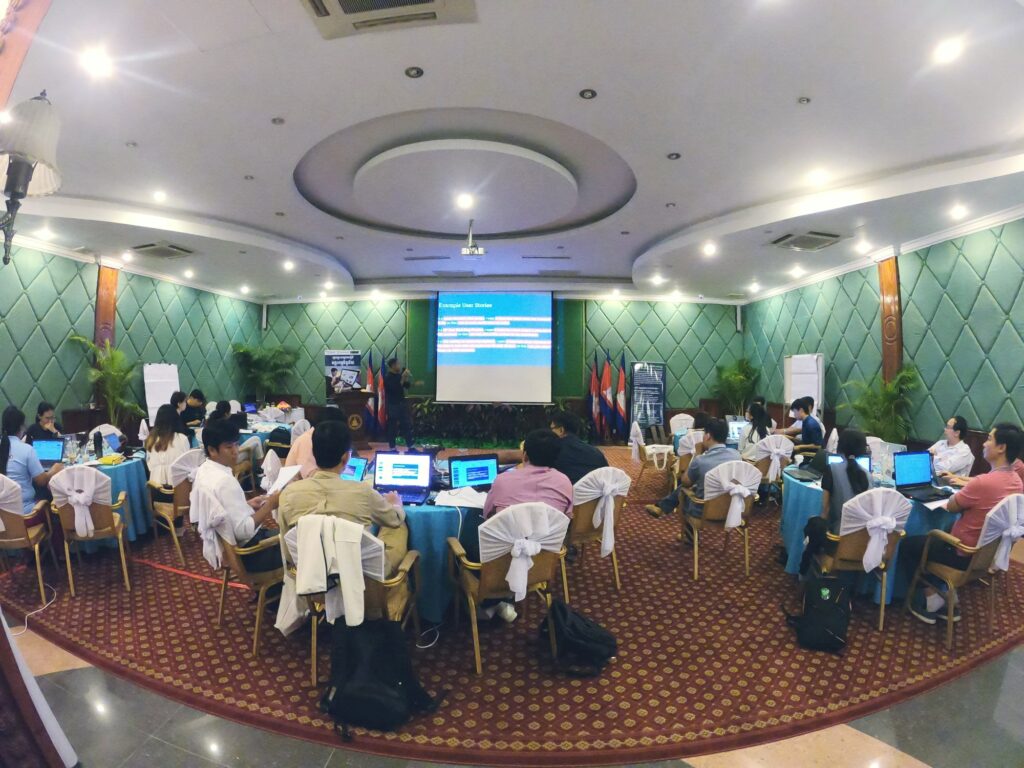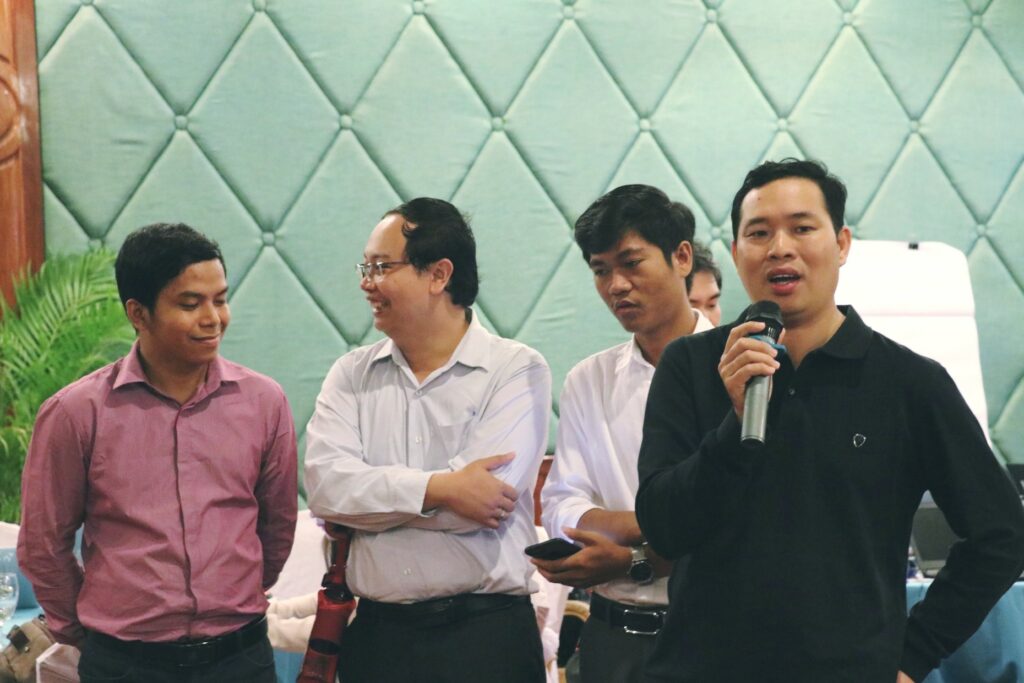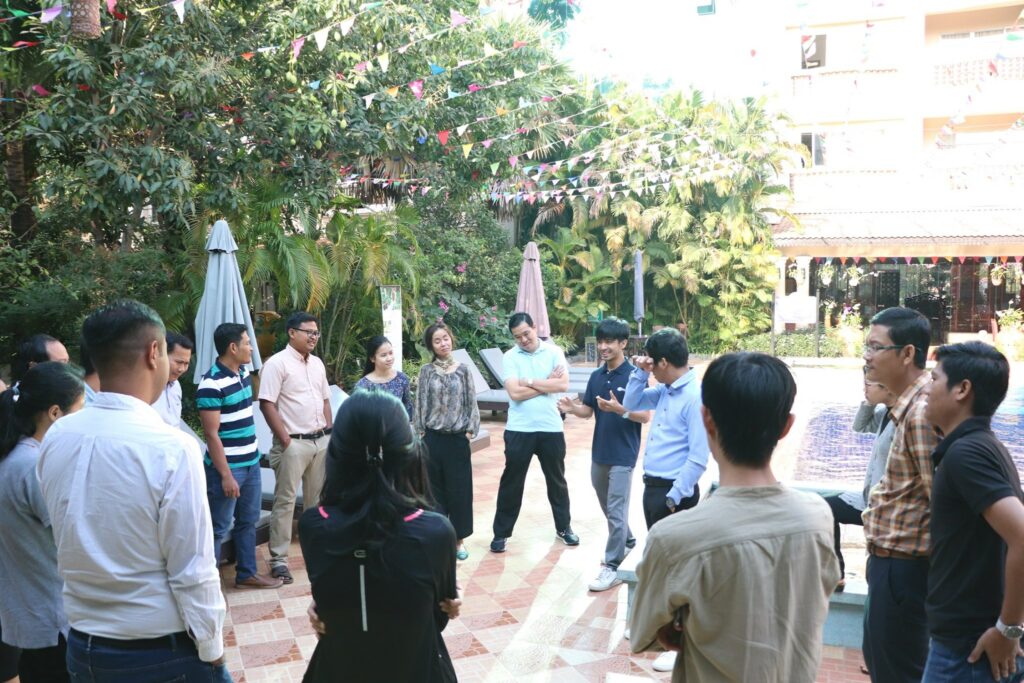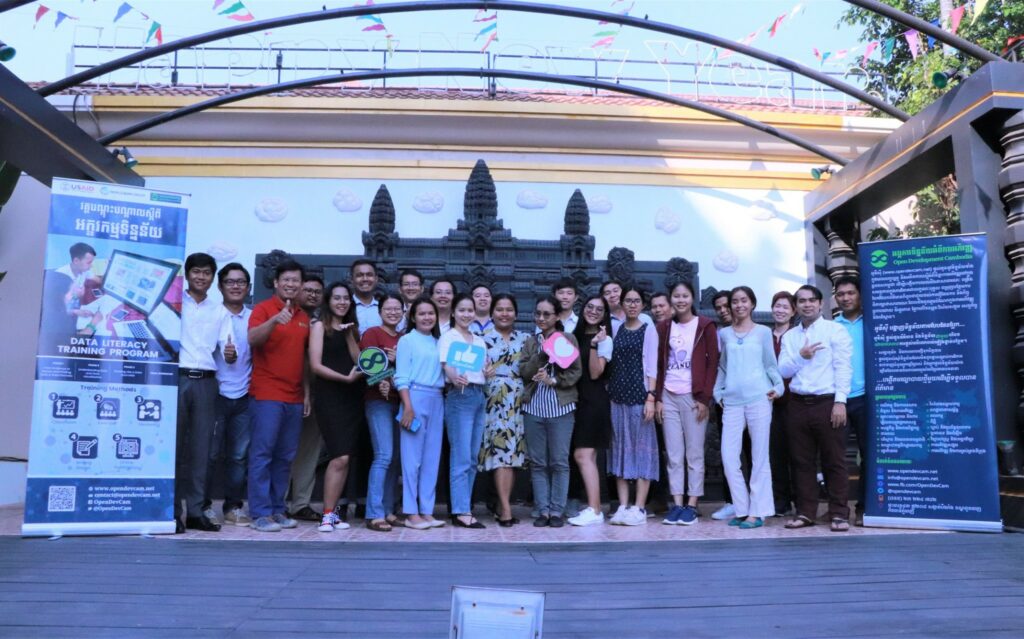អង្គការទិន្នន័យអំពីការអភិវឌ្ឍ បញ្ចប់វគ្គបណ្តុះបណ្តាលស្តីពី អក្ខរកម្មទិន្នន័យ
តាមរយៈជំនួយហិរញ្ញវត្ថុរបស់ គម្រោងពង្រឹងសមត្ថភាពអង្គការសង្គមស៊ីវិលកម្ពុជា (CCSS) នៃទីភ្នាក់ងារជំនួយអាមេរិក (USAID) អង្គការទិន្នន័យអំពីការអភិវឌ្ឍ ហៅកាត់ថា អូឌីស៊ី បានរៀបចំដោយជោគជ័យនៅកម្មវិធីបណ្តុះបណ្តាលចំនួន ៣ដំណាក់កាល ស្តីពីអក្ខរកម្មទិន្នន័យ ដែលជាការបណ្តុះបណ្តាលថ្មីដំបូងគេមួយនៅកម្ពុជា។ វគ្គបណ្តុះបណ្តាលនេះ មានសិក្ខាកាមចូលរួមប្រមាណ ២៥ រូប ដែលមកពីវិស័យផ្សេងៗគ្នា រួមមាន សង្គមស៊ីវិល សារព័ត៌មាន វិស័យឯកជន និងស្រាវជ្រាវ។ កម្មវិធីសិក្សាសម្រាប់វគ្គបណ្តុះបណ្តាលនេះ ត្រូវបានទាញយក និងប្រែសម្រួលចេញពីកម្មវីធីបណ្តុះបណ្តាលដែលមានស្រាប់របស់ធនាគារពិភពលោក និងដឹកនាំបង្រៀនដោយគ្រូបណ្តុះបណ្តាលបង្គោលរបស់យើងលោក Yan Naung Oak ដែលមកពីប្រទេស មីយ៉ាន់ម៉ា។
នៅក្នុងវគ្គបណ្តុះបណ្តាលដំណាក់កាល១ សិក្ខាកាមទាំងអស់ត្រូវបានណែនាំស្តីពីរបៀបគិតអំពីទិន្នន័យ ការស្វែងរកទិន្នន័យ ការសម្អាតទិន្នន័យ និងការស្វែងរករឿងរ៉ាវដែលចង់បង្ហាញនៅក្នុងសំណុំទិន្នន័យណាមួយ។ ខណៈពេលដែលវគ្គបណ្តុះបណ្តាលដំណាក់កាល២ យើងផ្តោតទៅលើ ការចេះវិនិច្ឆ័យទៅលើទិន្នន័យដែលមានស្រាប់តាមរយៈការដាក់ទិន្នន័យបញ្ចូលគ្នា ការបែងចែកទិន្នន័យ ឬការច្រោះទិន្នន័យជាដើម ហើយឧបករណ៍សម្រាប់បង្ហាញទិន្នន័យជារូបភាពមួយចំនួន ក៏ត្រូវបានណែនាំដល់សិក្ខាកាមឱ្យបានស្គាល់ និងចេះប្រើប្រាស់នៅក្នុងវគ្គនេះផងដែរ។ ពួកគេក៏បានរៀនប្រើប្រាស់ឧបរណ៍ទាំងនោះដោយប្រើសំណុំទិន្នន័យដែលពួកយើងបានផ្តល់ ក៏ដូចជាទិន្នន័យ ដែលពួកគេមានស្រាប់។ ក្នុងវគ្គបណ្តុះបណ្តាលដំណាក់កាល៣ ដែលបានធ្វើរៀបចំពីថ្ងៃទី១៣ ដល់ថ្ងៃទី១៧ ខែមករា ឆ្នាំ២០២០ យើងផ្តោតសំខាន់លើការបង្ហាញទិន្នន័យជារូបភាព (ទស្សនីយកម្មទិន្នន័យ) ដែលយើងបានបង្រៀនពីឧបករណ៍ផ្សេងៗទៀតដល់ពួកគេ។ ពួកគេក៏បានយកសំណុំទិន្នន័យដែលពួកគេប្រើក្នុងគម្រោងរបស់ពួកគេមកអនុវត្តន៍ការប្រើប្រាស់ឧបករណ៍ទាំងនេះផងដែរ។ សិក្ខាកាមក៏បានរៀនពីសុវត្ថិភាពទិន្នន័យនិង សារព័ត៌មានបែបទិន្នន័យ។
សិក្ខាកាមគិតថាអក្ខរកម្មទិន្នន័យជាចំណេះដឹងនិងជំនាញមួយដ៏ថ្មីស្រឡាង ហើយមានសារសំខាន់ខ្លាំងណាស់សម្រាប់ការងារនិងការរស់នៅរបស់គេ។
កញ្ញា ឃន ចំប៉ា ដែលជាអ្នកសារព័ត៌មានមួយរូប នៅសារព័ត៌មានអនឡាញថ្មីថ្មី បានឱ្យដឹងថា “ខ្ញុំមិនសូវដឹងពីបច្ចេកវិទ្យាប៉ុន្មានទេ តែក្នុងវគ្គបណ្តុះបណ្តាលនេះ ខ្ញុំបានទទួលចំណេះដឹងអំពីបច្ចេកវិទ្យាថ្មីៗ និងអំពីការប្រមូលទិន្នន័យ។ ការពិតទៅ យើងអាចទទួលបានទិន្នន័យជាច្រើនប្រភេទយ៉ាងងាយស្រួលលើអ៊ិនធើណែត។ មុនពេលចូលរួមវគ្គបណ្តុះបណ្តាលនេះ ខ្ញុំមិនដឹងពីរបៀបប្រមូលទិន្នន័យនោះទេ ដូច្នេះខ្ញុំគ្មានទិន្នន័យសម្រាប់ប្រើប្រាស់។ សំណាងល្អណាស់ ក្នុងវគ្គបណ្តុះបណ្តាលនេះ ខ្ញុំបានដឹងពីរបៀបរកទិន្នន័យ និងទាញយកទិន្នន័យ ព្រោះពេលយើងមានព័ត៌មាននិងទិន្នន័យគ្រប់គ្រាន់ យើងអាចសរសេររឿងមួយដែលមានអំណះអំណាងច្បាស់លាស់ ហើយសំខាន់សម្រាប់អ្នកអាន”។
លោក ម៉ៅ សំណាង ដែលជាអ្នកសារព័ត៌មានម្នាក់នៅស្ថានីយ៍ទូរទស្សន៍ ភីអិនអិន បានបង្ហាញពីសារសំខាន់នៃវគ្គបណ្តុះបណ្តាលអក្ខរកម្មទិន្នន័យនេះ។ លោកមានប្រសាសន៍ថា “ខ្ញុំរៀនបានច្រើនណាស់ពីវគ្គនេះទាក់ទងនឹងវិធីសាស្ត្រប្រមូលព័ត៌មាននិងទិន្នន័យ ហើយសំខាន់ជាងនេះទៀតនោះគឺ របៀបរកទិន្នន័យពីប្រភពផ្សេងៗគ្នា។ ទិន្នន័យពិតជាមានសារសំខាន់ណាស់សម្រាប់ពួកយើង ដើម្បីសរសេរព័ត៌មានមួយដែលមានភាពពេញលេញ។ ក្នុងវគ្គបណ្តុះបណ្តាលនេះ យើងក៏កំពុងធ្វើគម្រោងរៀងៗខ្លួនដើម្បីបង្កើតជាអត្ថបទមួយនៅចុងបញ្ចប់”។
លោកស្រី ម៉ែន វណ្ណាវី ដែលជាអ្នកប្រឹក្សាឯករាជ្យម្នាក់ មានប្រសាសន៍ថា “អ្នកអានចាប់អារម្មណ៍រូបភាពនិងក្រាហ្វិកច្រើនជាងសំណេរ ព្រោះសំណេរត្រូវការពេលច្រើនដើម្បីអាននិងយល់។ ក្រាហ្វិកមានភាពទាក់ទាញហើយងាយស្រួលយល់ជាងសម្រាប់សាធារណៈជន”។ ក្នុងវគ្គបណ្តុះបណ្តាលនេះ លោកស្រី វណ្ណាវី ចាប់អារម្មណ៍លើកម្មវិធីបង្ហាញទិន្នន័យជារូបភាពចំនួនពីរ។ ទីមួយគឺកម្មវិធី Flourish ព្រោះគាត់យល់ថាវាងាយស្រួលប្រើប្រាស់សម្រាប់បម្លែងទិន្នន័យទៅជាក្រាហ្វិក និងតារាងផ្សេងៗ។ កម្មវិធីទីពីរគឺ Data wrapper ព្រោះក្រៅពីមានមុខងារដែលមានដូចកម្មវិធីខាងលើ Data wrapper អាចឱ្យយើងបម្លែងទិន្នន័យទៅជាផែនទី និងសញ្ញាផ្សេងៗដោយគ្រាន់តែរៀបនិងសម្អាតទិន្នន័យរបស់យើង។
អំឡុងវគ្គបណ្តុះបណ្តាលនេះ សិក្ខាកាមទាំងអស់តម្រូវឱ្យធ្វើគម្រាងជាលក្ខណៈបុគ្គលរៀងៗខ្លួនទាក់ទងនឹងទិន្នន័យ ដែលអាចជាផលិតជាអត្ថបទព័ត៌មាន ក្រាប របាយការណ៍ ឬតារាងជាដើម។ ប្រធានបទនៃគម្រោងទាំងនោះមានដូចជា សេដ្ឋកិច្ច ការអប់រំ បរិស្ថាន កសិកម្ម យេនឌ័រ អនាម័យ និងសុខភាព។ ក្រុមការងារអូឌីស៊ី បាននិងកំពុងផ្តល់ ការគាំទ្រផ្នែកបច្ចេកទេស ទៅកាន់សិក្ខាកាមដើម្បីឱ្យពួកគេអាចធ្វើគម្រោងរបស់ពួកគេ។ គម្រោងទាំងនេះនឹងត្រូវបានបោះពុម្ពផ្សាយនៅលើគេហទំព័ររបស់អូឌីស៊ី ផងដែរ។
លោក រឿន ណារិទ្ធ ដែលជាអ្នកស្រាវជ្រាវ នៅ វិទ្យាស្ថានបណ្តុះបណ្តាល និងស្រាវជ្រាវដើម្បីអភិវឌ្ឍន៍កម្ពុជា (CDRI) បានបង្ហាញការវិវឌ្ឍនគួរឱ្យកត់សម្គាល់នៃគម្រោងទិន្នន័យរបស់គាត់បន្ទាប់ពីបានចូលរួមវគ្គបណ្តុះបណ្តាលអក្ខរកម្មទិន្នន័យគ្រប់ដំណាក់កាល។ លោកបានពេញចិត្តនឹងការបណ្តុះបណ្តាល ហើយបានបង្កើតប្លក់ដែលបង្ហាញពីស្ថានភាពពាណិជ្ជកម្មដំឡូងមីនៅកម្ពុជា។
ជាទូទៅ សិក្ខាកាមពេញចិត្តនឹងការបណ្តុះបណ្តាល ហើយបានអនុវត្តជំនាញដែលបានរៀន ក្នុងការងាររបស់ពួកគេ។ សិក្ខាកាមមួយចំនួនបានធ្វើគម្រោងរបស់គាត់រួចហើយ ដោយប្រើជំនាញទិន្នន័យដែលពួកគេបានរៀនពីវគ្គបណ្តុះបណ្តាលនេះ។
លោក វេន សារឿត ដែលជាមន្ត្រីស្រាវជ្រាវម្នាក់នៅអង្គការ អាក់សិនអេដ បានប្រើជំនាញក្នុងការបំប្លែងទិន្នន័យជារូបភាពដែលគាត់បានរៀនក្នុងវគ្គបណ្តុះបណ្តាល ដើម្បីផលិតរបាយការណ៍ស្តីពី សន្ទស្សន៍ភាពធនរបស់ស្រី្តនៅកម្ពុជា សម្រាប់អង្គការរបស់គាត់។ របាយការណ៍នេះត្រូវបានចែកចាយ ទាំងបោះពុម្ពនិងតាមអ៊ីនធឺណិត។
ដើម្បីទទួលបានទស្សនិកជនកាន់តែទូលំទូលាយ កម្មវិធីអក្ខរកម្មទិន្នន័យរបស់អូឌីស៊ី ក៏មានអ្នកចូលរួមពីបណ្តាខេត្តផងដែរ ដូចជាខេត្តស្វាយរៀង បាត់ដំបង និងសៀមរាប។
លោកស្រី ណេន គីមឡា មន្ត្រីតាមដាននិងវាយតម្លៃ និងសិក្សា នៅអង្គការ Voluntary Service Overseas (VSO) នៅខេត្តបាត់ដំបង បានធ្វើវគ្គបណ្តុះបណ្តាលបន្តទៅកាន់ក្រុមការងាររបស់គាត់។ មេរៀនដែលលោកស្រីបានយកទៅបណ្តុះបណ្តាល និងចែករំលែករួមមាន ការប្រើប្រាស់ Google Spread Sheet និង Microsoft Excel ដើម្បីសម្អាត និងចងក្រងទិន្នន័យដោយប្រើឧបករណ៍ដូចជា Pivot Table ។ លោកស្រីក៏បានណែនាំមិត្តរួមការងារឱ្យស្គាល់ឧបករណ៍បង្ហាញទិន្នន័យជារូបភាពមួយចំនួនដូចជា Data wrapper, Flourish និង Piktochart។
ទន្ទឹមនឹងនេះ ផ្អែកលើការស្ទង់មតិជាមួយអ្នកចូលរួម វគ្គបណ្តុះបណ្តាលមានផ្នែកមួយចំនួនដែលអាចកែលម្អឱ្យកាន់តែប្រសើរ និងមានប្រសិទ្ធភាព។ ចំណុចទាំងនោះរួមមាន ការរៀបចំវគ្គបណ្តុះបណ្តាលផ្សេងៗគ្នាសម្រាប់សិក្ខាកាមដែលមានអាជីពផ្សេងៗគ្នាទៅតាមតម្រូវការជាក់លាក់របស់ពួកគាត់។
អូឌីស៊ី នៅតែបន្តប្តេជ្ញាចិត្តគាំទ្រសិក្ខាកាម ដែលមានគម្រោងចែករំលែកចំណេះទាក់ទងនឹងទិន្នន័យទៅកាន់ក្រុមការងារឬអ្នកដទៃទៀត។ យើងអាចជួយគាំទ្រ ផ្នែកបច្ចេកទេសទាក់ទងនឹងទិន្នន័យ និងការបង្ហាញទិន្នន័យជារូបភាព ហើយយើងក៏អាចចូលរួមបណ្តុះបណ្តាលជាមួយផងដែរបើសិនត្រូវការ។
យើងសង្ឃឹមយ៉ាងមុតមាំថា ទោះបីជាវគ្គបណ្តុះបណ្តាលបញ្ចប់ សិក្ខាកាមនឹងនៅតែបន្តផលិតគម្រោងទាក់ទងនឹងទិន្នន័យ ហើយនឹងបន្តចែករំលែកចំណេះដឹងផ្នែកទិន្នន័យនេះទៅអ្នកដទៃកាន់តែច្រើន។
កម្មវិធីបណ្តុះបណ្តាលអក្ខរកម្មទិន្នន័យរបស់អូឌីស៊ី បានចាប់ផ្តើមតាំងពី ខែតុលា ឆ្នាំ២០១៩។ យើងនឹងមានសិក្ខាសាលាបញ្ចប់មួយទៀត ដើម្បីឱ្យសិក្ខាកាមបង្ហាញពីគម្រោងរបស់ពួកគេ។ សិក្ខាសាលាបញ្ចប់នេះនឹងធ្វើឡើងនៅ ថ្ងៃទី០៧ ខែមេសា ឆ្នាំ២០២០។





